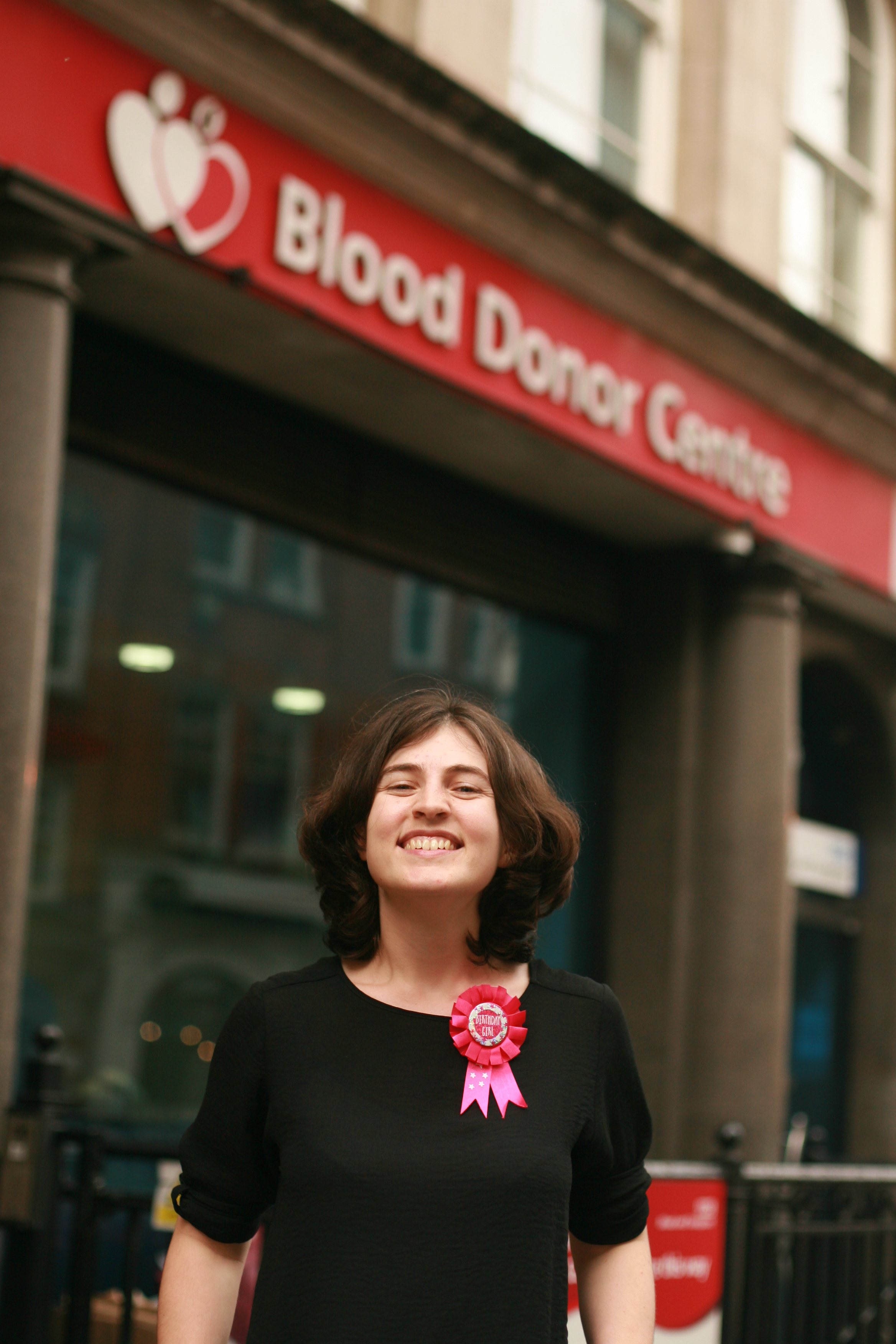Lucia Chaplin
In 2018, we shared a story by the journalist and best-selling author Caitlin Moran about donating blood for the first time in almost 20 years. The scene she painted – one of “hot dust, floor polish and tea” and “love for someone you’ve never met” – resonated with many donors.
In fact, there were so many positive responses in the days and weeks that followed, and so many donors replied with wonderful and heart-warming stories of their own that we decided we ought to make it a regular feature – Humans of Blood Donation.
This is Lucia Chaplin, a donor and junior doctor
Picture this: you are a junior doctor, on an acute ward of a busy hospital. A patient comes in very short of breath and looking quite pale. Their bloods have been taken in A&E.
Your anxiety starts first thing in the morning with reading their blood results, where their Hb (haemoglobin – that's the part of the blood that carries oxygen) is low. When you discuss their case with a senior doctor, you know what the instructions will be. Two units of blood.
The clock starts now.
You spend your first 10 minutes searching the wards until you find a special blood transfusion chart in order that you can prescribe the blood. There are strict regulations about matching the correct blood to the correct patient, to avoid any mistakes. For this reason, you need to take two samples for a 'cross-match' (that's the name of the test where your blood is tested for blood type, and checked alongside the donor blood to make sure they match), and you have to take these samples at separate times, and label them by hand.
There are strict regulations about matching the correct blood to the correct patient, to avoid any mistakes. For this reason, you need to take two samples for a 'cross-match' (that's the name of the test where your blood is tested for blood type, and checked alongside the donor blood to make sure they match), and you have to take these samples at separate times, and label them by hand.
You spend 15 minutes finding the right blood-taking equipment in often under-stocked clinic rooms, and then arrive at the patient's bedside to discover that they are off the ward for a test. You then have to put your tray of equipment down in a safe, locked space, knowing you will be told off for leaving clutter around.
Your job list is piling up, and several hours will pass before you manage to take a blood sample from your patient.
You take the bag with the blood tubes to a 'pod' (the internal system used to transport blood samples), but there are no plastic pods in the basket to use. You ask someone to ring the pathology lab to send some to your ward. You put the blood samples in your pocket while you try to do another job.
Eventually the sample is sent, and you have to think about taking the second one. You repeat the previous process. It is later in the afternoon now, and the consultant might come onto the ward for an update.
Your patient is still several steps away from receiving their needed treatment, and both patient and consultant are understandably frustrated that nothing has yet happened except more blood being taken from the patient, who is still feeling terribly unwell.
Once this second sample has been sent, you can then call the 'blood bank', and request the two units of blood. The line is busy. You leave to do another job. Thirty minutes later, you try calling again, and request the two units. They will call the ward when the blood is ready to be collected.
The phone on the ward rings non-stop and frequently goes unanswered as everyone rushes past.
For my birthday I invited some friends to give blood with me. Perhaps not a conventional birthday activity, but I wanted to invite people into the world of donating blood.
An hour later, you call the blood bank again to check in. The blood is ready, they say, they tried ringing, can you ask one of the nurses to go and collect the first bag? You try to find the nurse responsible for the patient. They are on their break. You ask one of their colleagues. They will tell them when they are back from break. You ask very nicely, please would you mind getting it? They are too busy (this is true – they are).
It is 6pm, and you are already an hour late leaving the ward. The patient's nurse spots you and comes over. They collected the first unit of blood, but discovered that the patient's cannula has tissued (meaning the vein has been damaged by the little tube that was inserted to administer the blood, and the tube can no longer be used).
You are faced with the dilemma of needing to leave work at some point (the jobs will never end), or handing over a cannula to the on-call doctor. This feels unkind, they will be covering many other wards for the evening. Handing this job over also risks the blood expiring, as it can only remain out of the fridge for a certain number of hours.

You, again, struggle to find the right equipment, and have three attempts at getting the cannula inserted, much to the distress of the patient, and yourself. By this time, the blood has been out of the fridge for so long that it may need to be disconnected before the four hours that it takes for a whole bag to run through.
The ward has a policy that no blood should be transfused overnight unless in an emergency – it is too dangerous. So you go home knowing that you may return the next morning to find that only one bag has been given, meaning that you will still have to wait until the afternoon for the second bag to finish before being able to check their Hb level again. Your consultant will not be happy, but you hope that the patient, at least, feels a little better.
I work in mental health now and so haven’t had to prescribe blood for several years now. I don’t miss it. But I am utterly convinced of the need for blood and of its powerful and unique role in treatment for certain conditions.
I estimate that I have prescribed perhaps 30 or 40 units of red blood cells in total, and I love the idea of donating the equivalent (although I won’t stop at that!).
The process of donating blood couldn’t be further from the fraught, stressful environment of the ward.
The process of donating blood couldn’t be further from the fraught, stressful environment of the ward. Instead, I’ve been welcomed into calm and friendly spaces where things generally run smoothly and efficiently. It has become very much a habit to donate, and I would love to encourage others to make it a habit too, like getting a haircut!
For my birthday, in June, I invited some friends along to book slots and give blood with me at the West End Donor Centre for my 25th donation.
Perhaps not a conventional birthday activity, but I wanted to invite people into the world of donating blood.
Hopefully I’ve shown them just how straightforward, fun, and thoroughly feel-good the process is.
Humans of Blood Donation
Amazing stories by our blood donors

Caitlin Moran
"I haven't given blood for 18 years. First there were babies, then work, and then I was drunk."
Share your story
If you have a way with words and want to share your story – be it of your first donation or your five hundredth – then please get in touch.
Email your story to thedonor@nhsbt.nhs.uk, including your name and contact details.
